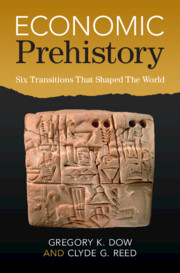‘In the last decade, it has become more and more obvious that it is impossible to understand the divergence in human societies without taking a deep historical perspective and embracing the wisdom in the social sciences outside of economics. This book pulls together the insights of two of the leaders of this dramatic intellectual transition. Remarkable and path-breaking.'
James Robinson - University of Chicago
‘This book is remarkable. It proposes an elegant microeconomic theory that grapples well with archaeology's confusingly rich prehistoric record. The book looks deeply and broadly to discuss how rational decisions may underlie major social transitions including beginning agriculture, expanding warfare, and first urbanism. The authors emphasize the value of generality with a unified theory that admirably challenges prehistorians to contemplate coherence in human history, anthropologists to reconsider their commitment to cultural uniqueness, and economists to incorporate long-term human prehistory in theory building.'
Timothy Earle - Northwestern University
‘This is the first book that applies modern economic analysis to the study of prehistory and explains how it's done. More than that, it presents the approach in such a way as to be accessible to a range of relevant audiences that do not have strong mathematical skills. I think it could mark the beginning of a new interdisciplinary field. The book is a model of reasoned lucidity as it explains the nature of economic models and economic approaches to non-economists, and addresses the many objections that non-economists tend to have.'
Stephen Shennan - University College London
‘In this one-of-a-kind book, economic theory meets history to shed a lot of light on how and why (some) human beings moved from living in nomadic, egalitarian communities of hunter-gatherers to agriculture, unequal societies, and powerful states. The authors offer us the best of political economy: elegant theory, lots of evidence, great insights. A must-read for those interested in development and, more generally, in our origins.'
Carles Boix - Princeton University
‘Dow and Reed's efforts to explain the transitions that gave rise to agrarian civilizations by applying the tools of modern economics constitute the most sophisticated and up-to-date work of its kind. It comes together here in a book that is at once deeply scholarly, original, and accessible to non-specialists, thanks to clear discursive summaries. It is must-reading for all concerned with the origins of the societies that were crucial stepping stones toward today's world.'
Louis Putterman - Brown University
‘In this book, Greg Dow and Clyde Reed summarize their own and other economists' important recent research on six fundamental transitions that shaped the world as we know it. I am convinced that their theoretical analysis of the emergence of sedentism, agriculture, inequality, war, cities, and states in prehistory will be a key reference for future research in the field and for economists with an interest in long-run development.'
Ola Olsson - University of Gothenburg



